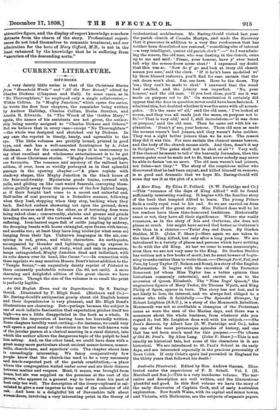An Old English Home and its Dependencies. By S. Baring-
Gould. Illustrated by F. Bligh Bond. (Methuen and Co.)— Mr. Baring-Gould's antiquarian gossip about old English homes and their dependencies is very pleasant, and Mr. Bligh Bond's illustrations are charming. But—perhaps because the subject is one of such infinite fascination that expectation pitches itself too high—we are a little disappointed in the book as a whole. It Produces the impression of having been too hurriedly written. Some chapters terribly want cutting,—for instance, we could very well spare a good many of the stories in the too well-known vein of the jocular parson at a clerical meeting in a rural district, into which the author allows the dangerous topic of the pulpit to lead him astray. And, on the other hand, we could have done with a great many more particulars about ancient manor-houses, manor- mills, church-inns, and squatters' cots. The chapter about inns is exceedingly interesting. We fancy comparatively few People know that the church-inn used to be a very necessary and much-respected part of the parish constitution,—a place where the congregation waited under cover and ate their dinners between matins and vespers. Meat, it seems, was brought from home, but ale was supplied on the premises at the cost of the parson, who appears in a general way to have done his part of heat only too well. The description of the livery-cupboard is cal- culated to give a new impetus to the zeal of the collector of old oak. And here is a delightful bit of Devonshire talk about scissm-doors, involving a very interesting point in the theory of ecclesiastical architecture. Mr. Baring-Gould visited last year the parish church of Coombe Martyn, and made the discovery that it possesses in addition to a very fine rood-screen that has neither been demolished nor restored, " something else of interest —a very intelligent, quaint old parish clerk " :—" As I was admir- ing the screen, the old man, who was dusting in the church, came up to me and said : Please, your honour, have y' ever heard tell why the screen-doom niver shut ? ' I expressed my doubt that this was so. Now do y' go and look at ivery old church screen you sees,' said the clerk. If it ho'n't been medalled wi by them blessed restorers, you'll find for sure sartain that the oak doors won't shut. Zur, see here. Here be the doors. Try 'em ; they can't be made to shut.' I answered that the wood had swelled, and the joinery was imperfect. No, your honour,' said the old man. ' If you look close, you'll see it was made on purpose not to fit.' On examination it certainly did appear that the door in question never could have been fastened. I admitted this, but doubted whether it was the same with all screen- gates. 'It's the same wi' all,' said the old man, I've looked at scores, and they was all made just the same, on purpose not to fit.'—' That is very odd,' said I, still incredulous.' It was done on purpose,' said the old man. Then he came out with his ex- planation. Doan't y' see, your honour. Them old men as made the screens weren't bad joiners, and they weren't tiles neither. They was a sight better joiners than we be now. The reason they did it was this. For sure sartain the chancel means heaven, and the body of the church means airth. And then, doan't it say in Scriptur, " The gates shall not be shut at all " ? Very well, if the chancel be meant to tell o' the heavenly Jerusalem, then the screen-gates must be made not to fit, that never nobody may never be able to fasten 'em no more. The old men weren't bad joiners, nor files—not they.' " The story of the suspicious miller who discovered that he had been unjust, and killed himself in remorse, is so good and dramatic that we hope Mr. Baring-Gould will some day use it as the plot of a novel.










































 Previous page
Previous page